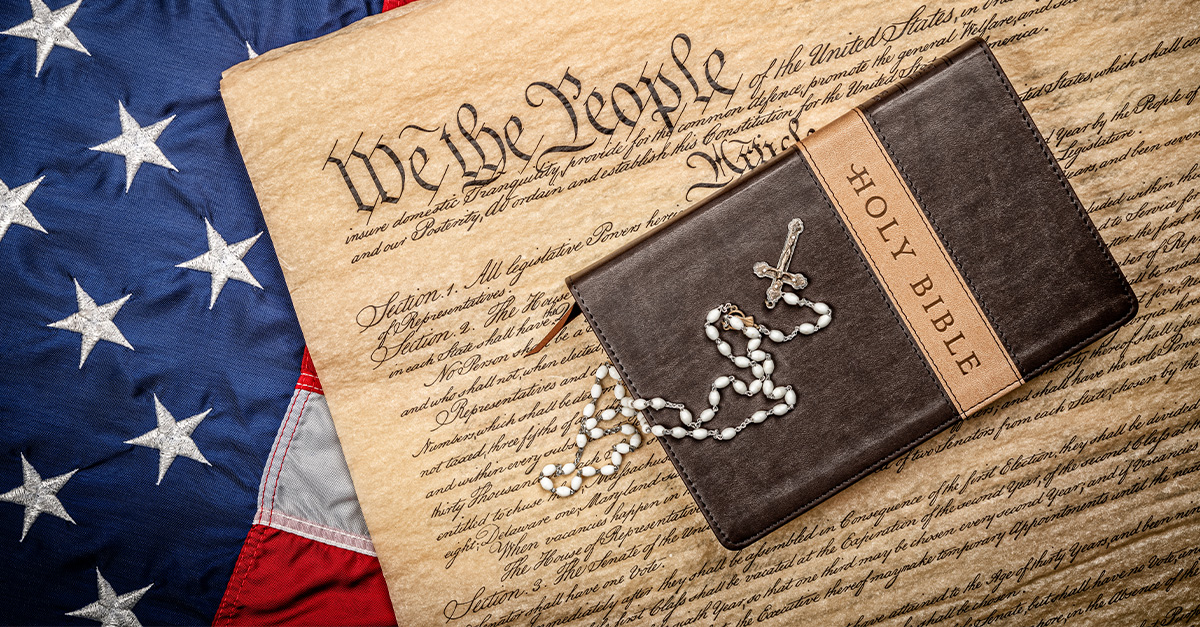


Get a free copy of Parental Rights & Education when you subscribe to our newsletter!

“After decades of hostility to religion, the tide is finally turning and the future of religious freedom is brighter than ever before. God has opened an incredible door for all Americans to express their faith, and it is up to us to walk through it.”
–”RESTORING FAITH IN AMERICA”
The Supreme Court made waves this summer in its decisions in Kennedy v. Bremerton School District, a case involving a football coach fired for praying at the 50-yard line, and Carson v. Makin, which considered whether parents can use a state’s tuition program to send their child to a religious school. In both cases, the Court aired on the side of religious freedom.
The plaintiffs in both cases were represented by First Liberty Institute, a legal group that specializes in cases involving religious exercise. Given that several Supreme Court decisions in the last few years have advanced religious freedom protections, First Liberty wants to ensure that Americans know about their “first freedom” rights.
The legal group launched its “Restoring Faith in America” initiative last week not only to inform Americans but also to encourage them to utilize their right to the free exercise of their religious beliefs. In an introductory video, the group explained:
“There’s a fresh wind blowing in America. After decades of hard-fought courtroom battles, legal precedents that silenced religious expression and government acknowledgement of religion have been overturned. The law has returned to our side. Americans can enjoy higher levels of religious freedom than we’ve had in generations. The America our founders envisioned is back.”
The website lists several modes of religious expression that are now allowed after recent Supreme Court decisions. According to First Liberty, some examples of newly allowed religious exercise listed include:
The Restoring Faith in America initiative encourages Americans to join the “movement” to bring back religious expression to communities. The website features articles and resources to help those who want to join.
“After decades of hostility to religion, the tide is finally turning and the future of religious freedom is brighter than ever before. God has opened an incredible door for all Americans to express their faith, and it is up to us to walk through it,” the website says.
The initiative primarily focuses on three Court decisions, Kennedy v. Bremerton School District, Carson v. Makin, and American Legion v. American Humanist Association.
In Kennedy, the Court ruled that Bremerton School District violated Coach Joe Kennedy’s right to religious exercise when it fired him for refusing to stop praying at the 50-yard line after games. The district claimed Kennedy was acting as a school official and coercing students to engage in religious expression.
The Court disagreed. Justice Neil Gorsuch authored the Court’s opinion. He wrote that
“a government entity sought to punish an individual for engaging in a brief, quiet, personal religious observance doubly protected by the Free Exercise and Free Speech Clauses of the First Amendment. And the only meaningful justification the government offered for its reprisal rested on a mistaken view that it had a duty to ferret out and suppress religious observances even as it allows comparable secular speech. The Constitution neither mandates nor tolerates that kind of discrimination.”
The Court’s opinion permits school employees to engage in religious exercise. Kennedy, who said, “All I’ve ever wanted was to be back on the field with my guys,” will now be permitted to do so as he and the district have established an agreement for him to return to coaching.
In Carson, the Supreme Court ruled that Maine, which has a school-choice tuition program due to its lack of public schools in certain areas, could not prohibit parents from using those tuition dollars to send their children to schools which provide religious instruction. The Court relied on previous rulings such as Espinoza v. Montana Department of Revenue and Trinity Lutheran Church of Columbia, Inc. v. Comer.
In Trinity, the Court ruled that Missouri couldn’t “expressly discriminate against otherwise eligible recipients by disqualifying them from a public benefit solely because of their religious character.” In Espinoza, the Court ruled, “State need not subsidize private education [b]ut once a State decides to do so, it cannot disqualify some private schools solely because they are religious.”
Explaining its ruling in Carson, the Court wrote,
“Maine has chosen to offer tuition assistance that parents may direct to the public or private schools of their choice. Maine’s administration of that benefit is subject to the free exercise principles governing any public benefit program—including the prohibition on denying the benefit based on a recipient’s religious exercise.”
The decision allows parents to use public tuition funds at religious schools.
In American Legion, also known as the Bladensburg Peace Cross case, the Supreme Court declared that a WWI memorial featuring a 40-foot cross was constitutional. The 2019 ruling stated that longstanding monuments with religious content should be presumed constitutional. This decision has protected several monuments from demolition after some organizations complained that religious symbols on public land violates the Constitution.
Other significant Supreme Court rulings advancing religious freedom in recent years include:

The Restoring Faith in America movement should remind Americans to not only celebrate these recent rulings but to take the lead in advancing religious freedom by publicly expressing their faith. Matthew 5:14-16 says,
“You are the light of the world. A city set on a hill cannot be hidden; nor does anyone light a lamp and put it under a basket, but on the lampstand, and it gives light to all who are in the house. Let your light shine before men in such a way that they may see your good works, and glorify your Father who is in heaven.”
Christians must understand that the right to religious freedom is a tool for sharing our faith. So Christian, do not hide your faith. As you have been commanded, go forth and tell your fellow Americans the Good News of Christ’s saving grace. They need to hear it — now more than ever.
Ready to dive deeper into the intersection of faith and policy? Head over to our Theology of Politics series page where we’ve published several long-form pieces that will help Christians navigate where their faith should direct them on political issues.

Notifications